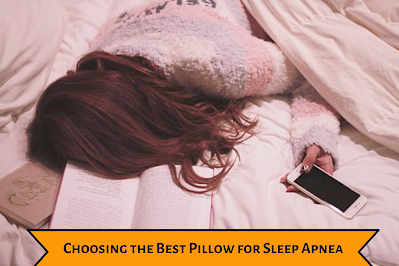Sleep apnea, a common sleep complaint characterized by interrupted breathing during sleep, affects millions of individualities worldwide. While medical interventions like nonstop Positive Airway Pressure( CPAP) machines are frequently recommended, opting the right pillow can also play a pivotal part in managing sleep apnea symptoms. In this composition, we will explore the best pillow for sleep apnea, the benefits of using them, and essential factors to consider when choosing the best pillow for sleep apnea .
Do Sleep Apnea Pillows Really Work?
Sleep apnea pillows can be effective in perfecting sleep quality and reducing symptoms for some individualities. still, it's important to note that the effectiveness may vary from person to person. Sleep apnea pillows should be used in convergence with other recommended treatments, analogous as CPAP remedy, life variations, and regular medical follow- ups.
Is it Better to Sleep with or Without a Pillow for Sleep Apnea?
Sleeping without a pillow is generally not recommended for individualities with sleep apnea. The use of a pillow can help maintain proper alignment of the head, neck, and chine, which can ameliorate tailwind and reduce the threat of airway inhibition during sleep. still, chancing the right pillow that suits your individual requirements is pivotal.
How a pillow can help sleep apnea?
Is There a Pillow That Helps with Sleep Apnea? Yes, certain pillows are specifically designed to help individualities with sleep apnea. These pillows frequently have unique features similar as contouring, elevated neck support, or specialized cutouts to accommodate CPAP masks. They're intended to promote proper breathing alignment and reduce the circumstance of dammed airways during sleep.
How Many Pillows Should I Use with Sleep Apnea?
The number of pillows you should use for sleep apnea depends on your comfort and individual requirements. In utmost cases, a single pillow that provides proper support and alignment is sufficient. Using too numerous pillows can affect in unnatural bending of the neck, potentially worsening sleep apnea symptoms.
Does Sleeping on Two Pillows Help Sleep Apnea?
Sleeping on two pillows is generally not recommended for sleep apnea. It can elevate the head and neck too much, causing strain and potentially gumming the airways. It's important to maintain a neutral alignment of the chine and airways during sleep.
What Is the Best Pillow for Sleep Apnea?
When searching for the stylish pillow for sleep apnea, it's important to look for specific features that promote proper alignment of the head, neck, and chine. Then are a many options to consider
- Contour Memory Foam Pillow: Designed to conform to the shape of your head and neck, figure memory froth pillows give optimal support and help keep the airways open during sleep.
- Orthopedic Pillow: These pillows are designed to support the natural curve of the chine, reducing pressure on the airways and promoting better breathing during sleep.
- Malleable garret Pillow: Some individualities with sleep apnea find malleable garret pillows salutary as they allow you to customize the height and firmness, icing optimal alignment and comfort.
What Should You Look for in a Pillow for Sleep Apnea? Tips to Select the Perfect Pillow for Sleep Apnea
Choosing the right pillow is essential for individualities with sleep apnea, as it can significantly impact sleep quality and palliate symptoms. With multitudinous options available on the request, opting a pillow that caters to your specific requirements can feel inviting. In this composition, we will give you with helpful tips to elect the perfect pillow for sleep apnea, icing optimal comfort, support, and bettered breathing during sleep.
Consider Your Sleeping Position
Your resting position plays a pivotal part in determining the type of pillow that will best suit your requirements. Then are recommendations grounded on different sleeping positions
- Side Sleepers: Conclude for a establishment, contoured pillow that supports the natural wind of your neck, icing proper alignment and maintaining an open airway.
- Back Sleepers: Look for a medium- establishment pillow that supports your neck without tipping your head too far forward or backward. This helps help the inhibition of the airway during sleep.
- Stomach Sleepers: Sleeping on your stomach is generally not recommended for individualities with sleep apnea. still, if it's your favored position, use a soft, low- profile pillow to reduce strain on your neck and maintain better alignment.
Seek Proper Neck Support
Supporting the neck is vital for sleep apnea cases, as it helps keep the airway open and promotes healthy breathing during sleep. Look for a pillow that provides respectable neck support, whether it's a contoured memory head pillow or an orthopedic pillow designed specifically for sleep apnea. The pillow should align your neck with your spine, minimizing the trouble of airway inhibition.
Evaluate Pillow Loft and Firmness
The loft, or thickness, of a pillow is another important consideration. The ideal pillow loft will depend on your sleeping position and personal preference:
- Side Sleepers: Choose a pillow with a higher loft to fill the gap between your ear and shoulder, ensuring proper alignment and reducing the risk of airway blockage.
- Back and Stomach Sleepers: Opt for a medium to low loft pillow to prevent excessive bending of the neck and maintain a more neutral position.
Regarding firmness, look for a pillow that strikes the right balance between support and comfort. A pillow that is too firm can create discomfort, while one that is too soft may not provide adequate support for your neck and spine.
Prioritize Breathability
Sleep apnea can often be exacerbated by excessive heat and sweating during sleep. Therefore, it's crucial to choose a pillow made from breathable materials that allow air to circulate, preventing overheating and promoting a cool sleeping environment. Pillows made from memory foam infused with cooling gel or those with ventilation holes are excellent choices for enhanced breathability.
Allergen-Resistance and Hypoallergenic Properties
If you suffer from allergies or sensitivities, consider pillows that are hypoallergenic and resistant to dust mites. These pillows are typically made from materials such as latex or high-quality microfiber, which help minimize allergic reactions and keep your sleep environment clean and healthy.
Compatibility with CPAP Therapy
For individuals using CPAP therapy, it's important to choose a pillow that accommodates the mask and hose. Look for pillows specifically designed with cutouts or contours to provide comfortable space for your CPAP equipment, ensuring an uninterrupted sleep experience.
Conclusion Of Choosing the Best Pillow for Sleep Apnea
Opting the stylish pillow for sleep apnea is pivotal for maintaining proper alignment, support, and optimal breathing during sleep. By considering your resting position, neck support, pillow garret and firmness, breathability, allergen- resistance, and comity with CPAP remedy, you can make an informed choice. Flash back, it's always salutary to consult with a healthcare professional or sleep specialist who can give individualized recommendations grounded on your specific requirements. With the perfect pillow, you can enhance your sleep quality and take important way toward managing sleep apnea effectively.



.jpg)




0 Comments